Related Research Articles

The Battle of Xiaoting (猇亭之戰), also known as the Battle of Yiling and the Battle of Yiling and Xiaoting, was fought between the state of Shu and the state of Wu, between the years 221 and 222 in the early Three Kingdoms period of China. The battle is significant because Wu was able to turn the situation from a series of initial losses into a defensive stalemate, before proceeding to win a decisive victory over Shu. The Wu victory halted the Shu invasion and preceded the death of Liu Bei, Shu's founding emperor.

Zhuge Liang, also commonly known by his courtesy name Kongming, was a Chinese statesman, strategist, and engineer who lived through the end of the Eastern Han dynasty and the early to mid-Three Kingdoms period (220–280) of China. During the Three Kingdoms period, he served as the Imperial Chancellor of the state of Shu Han (221–263) from its founding in 221 and later as regent from 223 until his death in September or October 234.
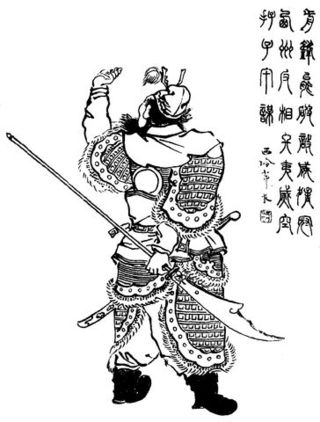
Wei Yan, courtesy name Wenchang, was a Chinese military general and politician of the state of Shu Han during the Three Kingdoms period of China. Originally a subordinate of the warlord Liu Bei in the late Eastern Han dynasty, Wei Yan rose through the ranks and became a general when Liu Bei seized control of Yi Province in 214. His performance in battle helped him to become a prominent figure in the Shu military in a short period of time. He was later appointed as the Administrator of Hanzhong Commandery and as an Area Commander in 219. Between 228 and 234, he participated actively in the Northern Expeditions led by the Shu regent Zhuge Liang against Shu's rival state, Cao Wei. After Zhuge Liang's death in c.September 234, Wei Yan was killed by another Shu general, Ma Dai, for alleged treason.
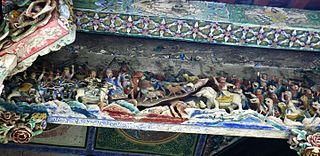
Zhuge Liang's Southern Campaign, also known as the War of Pacification in Nanzhong, was a military campaign which took place in 225 during the early Three Kingdoms period (220–280) of China. It was led by Zhuge Liang, the Imperial Chancellor of the state of Shu Han, against opposing forces in the Nanzhong region. The campaign was a response to rebellions started by local governors in the Nanzhong region and intrusions by the Nanman.

Zhuge Liang's Northern Expeditions were a series of five military campaigns launched by the state of Shu Han against the rival state of Cao Wei from 228 to 234 during the Three Kingdoms period in China. All five expeditions were led by Zhuge Liang, the Imperial Chancellor and regent of Shu. Although they proved unsuccessful and ended up as a stalemate, the expeditions have become some of the best known conflicts of the Three Kingdoms period and one of the few battles during it where each side fought against each other with hundreds of thousands of troops, as opposed to other battles where one side had a huge numerical advantage.

Zhong Hui, courtesy name Shiji, was a Chinese calligrapher, essayist, military general, and politician of the state of Cao Wei during the Three Kingdoms period of China. He was the younger son of Zhang Changpu with Zhong Yao, who served as the Grand Tutor in the Wei imperial court. He was already known for being insightful, intelligent and knowledgeable since he was young. Zhong Hui rose to prominence in the 250s when he became a close aide to Sima Zhao, the regent and de facto ruler of Wei. He advised Sima Zhao on how to deal with the Third Rebellion in Shouchun from 257 to 258 and was highly regarded by the latter. With Sima Zhao's help, Zhong Hui steadily moved up the ranks and became one of the key figures in the Wei government.

Cao Zhen, courtesy name Zidan, was a military general of the state of Cao Wei during the Three Kingdoms period of China. He was an adopted son of Cao Cao, a warlord who rose to power in the late Eastern Han dynasty and laid the foundation for Wei. After Cao Cao's death and the end of the Eastern Han dynasty, Cao Zhen served under Cao Pi and Cao Rui, the first two emperors of Wei. He is best known for leading a successful defence of Wei from the first two of a series of invasions by Wei's rival state, Shu Han, between 228 and 229.

Zhuge Dan, courtesy name Gongxiu, was a Chinese military general and politician of the state of Cao Wei during the Three Kingdoms period of China. When he held key military appointments throughout his middle to late career, he was involved in all of the three rebellions which broke out in Shouchun between 251 and 258. During the second rebellion, he actively assisted the Wei regent Sima Shi in suppressing the revolt. After the rebellion, the Wei government put him in charge of Shouchun. As the Sima clan became more powerful and established themselves as the de facto rulers of Wei, Zhuge Dan feared that he would end up slain like Wang Ling and Guanqiu Jian – the leaders of the first two rebellions – so he started the third rebellion against Sima Zhao, who succeeded Sima Shi as regent of Wei in 255. Although he received some support from Wei's rival state Eastern Wu, his rebellion was eventually suppressed by Wei imperial forces and he met his end at the hands of Hu Fen, a military officer under Sima Zhao.
Li Yan, courtesy name Zhengfang, also known as Li Ping, was a military general of the state of Shu Han during the Three Kingdoms period of China. He climbed to the zenith of his career when he was asked by the Shu emperor Liu Bei to be the military paramountcy and co-regent alongside Zhuge Liang for his son and successor, Liu Shan. After the death of Liu Bei, Li Yan was given the rank of General of the Vanguard which was last held by Guan Yu back in 220. Li served most of his career in the mid and late 220s as the area commander for the Eastern Front centered in Yong An with Chen Dao as his deputy; he never faced any major battles in his position. However, during the 230s and the 4th of Zhuge Liang's Northern Expeditions, Li Yan was given a higher rank of General of the Agile Cavalry, below only Zhuge Liang. He was assigned to handle logistics, but he was unable to deliver supplies to Zhuge Liang's army in a timely manner. After his attempt to fraudulently cover his inability to follow commands, Li Yan was stripped from positions and power.

Wang Ping, courtesy name Zijun, was a military general of the state of Shu Han in the Three Kingdoms period of China. Originally a military officer serving under the warlord Cao Cao. In 219, he defected to Cao Cao's rival Liu Bei during the Hanzhong Campaign. Although he was a talented orator, Wang Ping never learned to read because he joined the army at a young age. However, he did not let this disadvantage stop him and had his clerk help him with his reports. Known for his self discipline, he steadily rose through the ranks to become a senior general. During his career, he defeated Zhang He, quelled Wei Yan's alleged rebellion and was the leading commander of the Shu forces during the Battle of Xingshi. The highest position he reached was Senior General Who Guards the North (鎮北大將軍).
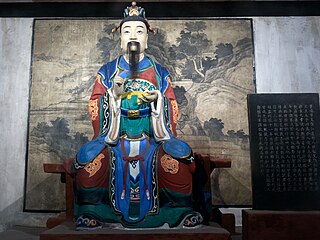
Fei Yi, courtesy name Wenwei, was a Chinese diplomat, military general, politician, and regent of the state of Shu during the Three Kingdoms period of China. Born in the late Eastern Han dynasty, Fei Yi started his career as an attendant to Liu Shan, the eldest son and heir apparent of Liu Bei, a warlord who became the founding emperor of Shu. After Liu Shan became emperor in 223, Fei Yi gradually rose to prominence under the regency of Zhuge Liang, the Imperial Chancellor of Shu. During this time, he concurrently served as a military adviser under Zhuge Liang and as Shu's ambassador to its ally state Wu. He also played a significant role in the conflict between the Shu general Wei Yan and Zhuge Liang's chief clerk Yang Yi. After Zhuge Liang's death in 234, Fei Yi served as a deputy to the new regent Jiang Wan and progressively assumed greater responsibilities as Jiang Wan gradually relinquished his powers due to poor health. In 244, Fei Yi led Shu forces to victory at the Battle of Xingshi against their rival state Wei and succeeded Jiang Wan as regent of Shu two years later following the latter's death. On the first day of the Chinese New Year in 253, Fei Yi was assassinated by a Wei defector, Guo Xiu.
Hao Zhao, courtesy name Bodao, was a military general of the state of Cao Wei during the Three Kingdoms period of China. He is best known for his victory at the siege of Chencang in 229 when he led a successful defence of Chencang against an invasion by a much larger army from Wei's rival state Shu Han. However, he died of illness not long after that.

The Empty Fort Strategy involves using reverse psychology to deceive the enemy into thinking that an empty location is full of traps and ambushes, and therefore induce the enemy to retreat. It is listed as the 32nd of the Thirty-Six Stratagems. Some examples are listed in the following sections.
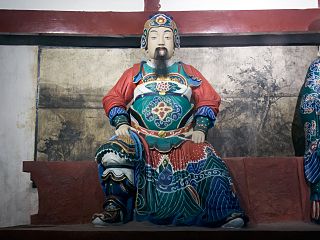
Deng Zhi, courtesy name Bomiao, was a government official, diplomat and military general of the state of Shu Han during the Three Kingdoms period of China. A descendant of Deng Yu, Deng Zhi started his career in the late Eastern Han dynasty under the warlord Liu Bei as a low-level officer in Pi County. After Liu Bei discovered his talent, Deng Zhi steadily rose through the ranks to become a county prefect and later a commandery administrator and imperial secretary. In 223, the Shu regent Zhuge Liang sent him as Shu's envoy to meet Sun Quan, the ruler of Shu's ally state Wu, and reestablish the Wu–Shu alliance against their common rival state Wei. Deng Zhi succeeded in his mission and earned praise from Sun Quan for strengthening Wu–Shu ties. In 227, Deng Zhi became a military general and he participated in the first Shu invasion of Wei by leading a decoy force with Zhao Yun to distract the Wei general Cao Zhen. Although they lost the battle, Deng Zhi and Zhao Yun managed to rally their troops to put up a firm defence during their retreat and minimise their losses. Following Zhuge Liang's death in 234, Deng Zhi rose to higher general ranks and was stationed in present-day Chongqing for about 10 years before he was recalled back to the Shu capital Chengdu in his 70s to serve as General of Chariots and Cavalry. In 248, he suppressed a rebellion in Fuling. He died in 251.
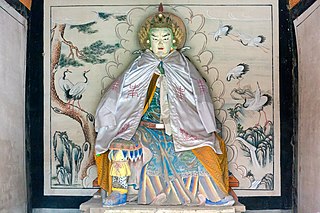
Yang Yi, courtesy name Weigong, was an official of the state of Shu Han in the Three Kingdoms period of China.

The Battle of Wuzhang Plains was fought between the contending states of Cao Wei and Shu Han in 234 AD during the Three Kingdoms period of China. The battle was the fifth and last of a series of Northern Expeditions led by Shu's chancellor, Zhuge Liang, to attack Wei. Zhuge Liang fell ill and died during the stalemate and subsequently the Shu forces retreated.
Jiang Wei's Northern Expeditions refer to a series of eleven military campaigns launched by the state of Shu Han against its rival state, Cao Wei, between 240 and 262 CE during the Three Kingdoms period in China. The campaigns were led by Jiang Wei, a prominent Shu general. Unlike the previous Northern campaigns led by Zhuge Liang, which added Wudu and Yinping commanderies to Shu Han state territories, Jiang Wei's campaigns ended up being unpopular in both the military and civil circles in Shu. Also unlike Zhuge Liang's campaigns which often featured 60,000 to sometimes even 100,000 Shu Troops, Jiang Wei's were often much smaller rarely exceeding 30,000 even after the death of Fei Yi, where Jiang Wei assumed control of the military. The Zhuge Liang campaigns did suffer from logistical and supply issues for their large army. Zhuge's successor Jiang Wan, believed that it was the Hanzhong's mountainous terrain itself that were to blame for the campaigns failures and attempted to switch the route thru the Han river. Fei Yi, who succeeded Jiang Wan, agreed, and never allowed any large campaigns to be launched by Hanzhong. Jiang Wei however overlooked these concerns and used Hanzhong as his home base as Zhuge Liang did.

The Conquest of Shu by Wei was a military campaign launched by the dynastic state of Cao Wei against its rival Shu Han in late 263 during the Three Kingdoms period of China. The campaign culminated in the fall of Shu Han and the tripartite equilibrium maintained in China for over 40 years since the end of the Eastern Han dynasty in 220. The conquest laid the foundation for an eventual reunified China under the Western Jin dynasty in 280.
Deng Yang, courtesy name Xuanmao, was an official of the state of Cao Wei in the Three Kingdoms period of China.

The Battle of Mount Qi was a military conflict which took place around Mount Qi between the states of Cao Wei and Shu Han in 231 during the Three Kingdoms period of China. It was also the most vigorous of the five Shu invasions of Wei, resulting in thousands of deaths on both sides. Although Zhuge Liang was able to make significant achievement in the beginning of the battle, the battle finally concluded with a strategic Wei victory due to the insufficient food supply for the Shu Han army. The insufficient food supply was caused by heavy rain and mistakes made by Li Yan. The Shu regent, Zhuge Liang, spent three years recuperating before launching another invasion on Wei in 234.
References
- 1 2 3 4 5 6 7 8 9 Sima (1084), vol. 71.
- ↑ (詔策亮曰:「街亭之役,咎由馬謖,而君引愆,深自貶抑,重違君意,聽順所守。前年耀師,馘斬王雙;今歲爰征,郭淮遁走;降集氐、羌,興復二郡,威鎮凶暴,功勳顯然。方今天下騷擾,元惡未梟,君受大任,幹國之重,而乆自挹損,非所以光揚洪烈矣。今復君丞相,君其勿辭。」) Sanguozhi vol. 35.
- ↑ ([太和]四年,朝洛陽,遷大司馬,賜劒履上殿,入朝不趨。) Sanguozhi vol. 9.
- ↑ (羣以爲「太祖昔到阳平攻張鲁,多收豆麦以益軍粮,鲁未下而食犹乏。今既无所因,且斜谷阻险,難以进退,转运必见钞截,多留兵守要,則损戰士,不可不熟虑也」。) Sanguozhi vol. 22.
- ↑ (真當發西討,帝親臨送。) Sanguozhi vol. 9.
- ↑ (真以八月發長安,從子午道南入。司馬宣王泝漢水,當會南鄭。諸軍或從斜谷道,或從武威入。) Sanguozhi vol. 9.
- ↑ (八年,迁骠骑将军。以曹真欲三道向汉川,亮命严将二万人赴汉中。亮表严子丰为江州都督督军,典为后事。) Sanguozhi vol. 40.
- ↑ (黃初中為偏將軍。子午之役,霸召為前鋒,進至興勢圍,安營在曲谷中。蜀人望知其是霸也,指下兵攻之。霸手戰鹿角間,賴救至,然後解。) Weilue annotation in Sanguozhi vol. 9.
- ↑ (八年,使延西入羌中,魏後將軍費瑤、雍州刺史郭淮與延戰于陽谿,延大破淮等,遷為前軍師征西大將軍,假節,進封南鄭侯。) Sanguozhi vol. 40.
- ↑ (歆上疏曰:「兵亂以來,過踰二紀。大魏承天受命,陛下以聖德當成康之隆,宜弘一代之治,紹三王之迹。雖有二賊負險延命,苟聖化日躋,遠人懷德,將襁負而至。夫兵不得已而用之,故戢而時動。臣誠願陛下先留心於治道,以征伐爲後事。且千里運糧,非用兵之利;越險深入,無獨克之功。如聞今年徵役,頗失農桑之業。爲國者以民爲基,民以衣食爲本。使中國無饑寒之患,百姓無離土之心,則天下幸甚,二賊之釁,可坐而待也。臣備位宰相,老病日篤,犬馬之命將盡,恐不復奉望鑾蓋,不敢不竭臣子之懷,唯陛下裁察!」) Sanguozhi vol. 13.
- ↑ (阜上疏曰:「昔文王有赤烏之符,而猶日仄不暇食;武王白魚入舟,君臣變色。而動得吉瑞,猶尚憂懼,況有災異而不戰竦者哉?今吳、蜀未平,而天屢降變,陛下宜深有以專精應荅,側席而坐,思示遠以德,綏邇以儉。閒者諸軍始進,便有天雨之患,稽閡山險,以積日矣。轉運之勞,擔負之苦,所費以多,若有不繼,必違本圖。傳曰:『見可而進,知難而退,軍之善政也。』徒使六軍困於山谷之間,進無所略,退又不得,非主兵之道也。武王還師,殷卒以亡,知天期也。今年凶民饑,宜發明詔損膳減服,技巧珍玩之物,皆可罷之。昔邵信臣爲少府於無事之世,而奏罷浮食;今者軍用不足,益宜節度。」) Sanguozhi vol. 25.
- ↑ (肅上疏曰:「前志有之,『千里饋糧,士有饑色,樵蘇後爨,師不宿飽』,此謂平塗之行軍者也。又況於深入阻險,鑿路而前,則其爲勞必相百也。今又加之以霖雨,山坂峻滑,衆逼而不展,糧縣而難繼,實行軍者之大忌也。聞曹真發已踰月而行裁半谷,治道功夫,戰士悉作。是賊偏得以逸而待勞,乃兵家之所憚也。言之前代,則武王伐紂,出關而復還;論之近事,則武、文征權,臨江而不濟。豈非所謂順天知時,通於權變者哉!兆民知聖上以水雨艱劇之故,休而息之,後日有釁,乘而用之,則所謂恱以犯難,民忘其死者矣。」) Sanguozhi vol. 13.
- ↑ (會大霖雨三十餘日,或棧道斷絕,詔真還軍。) Sanguozhi vol. 9.
- ↑ (真病還洛陽,帝自幸其第省疾。真薨,謚曰元侯。) Sanguozhi vol. 9.
- ↑ (遷為前軍師征西大將軍,假節,進封南鄭侯.) Sanguozhi vol. 40.
- ↑ (亮以明年當出軍,命嚴以中都護署府事。嚴改名為平。) Sanguozhi vol. 40.
- ↑ (七年春,魏大將軍曹爽率步騎十餘萬向漢川,前鋒已在駱谷。時漢中守兵不滿三萬,諸將大驚。) Sanguozhi vol. 43.
- Chen, Shou. Records of the Three Kingdoms (Sanguozhi).
- Pei, Songzhi. Annotations to Records of the Three Kingdoms (Sanguozhi zhu).
- Sima, Guang (1084). Zizhi Tongjian .